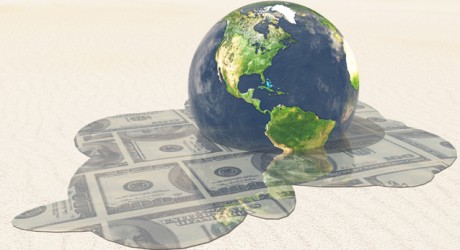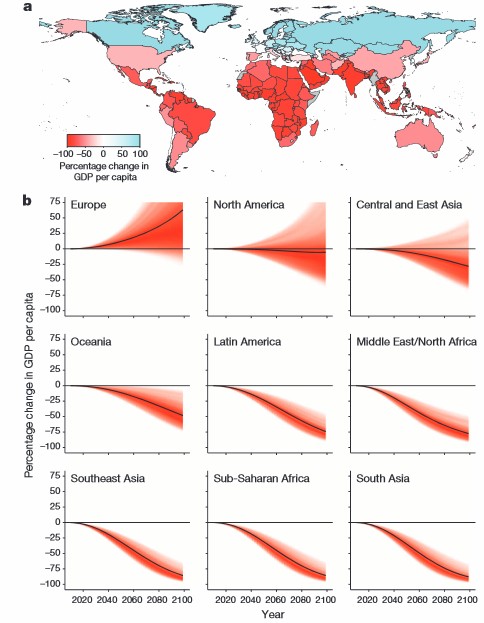October 22, 2015 – Solomon Hsiang, professor of economics and public policy at University of California Berkeley, as co-author of a new study on the impact of climate change is quoted stating,
“What climate change is doing is basically devaluing all the real estate south of the United States and making the whole planet less productive……Climate change is essentially a massive transfer of value from the hot parts of the world to the cooler parts of the world.”
Along with Marshall Burke, Stanford University, the two have compiled economic data from 166 countries over 50 years and determined that the Goldilocks temperature for maximizing human productivity is 13 Celsius (55 Fahrenheit) plus or minus one. With a global average throughout the 20th century of 14 Celsius (57 Fahrenheit), last year reaching 14.5 (58.24), and this year on a pace to surpass even that, the Earth is already passing optimal productivity temperatures. Based on their projections the authors calculate that as the United States warms through the rest of the century, gross domestic product (GDP) per capita will drop 36%.
For countries south of the United States the indications are far more dire with the authors concluding that:
- 77% of countries will be poorer in per capita terms.
- Impact of warming will have greatest negative affect on Sub-Saharan Africa, South and Southeast Asia, the Middle East-North Africa, Oceania and Latin America.
The above map and graphs show estimated changes to per capita GDP from 2000 to 2100. The red shaded countries are those most impacted by climate change. Pink-shaded countries will see relatively minor declines in GDP. Countries appearing in light blue will see GDP growth over the century. When compared with income data that defines rich versus poor, it is richer countries comparatively that will be least affected by future warming.
One of the findings from this study indicates that even slight warming generates expected costs of climate change 2.5 to 100 times greater than prior estimates based on global average temperatures rising 2 Celsius (3.6 Fahrenheit). The authors note that the study is only based on temperature effects. It does not look at extreme weather events, sea level rise and other issues associated with climate change. In their conclusions they state “climate change is expected to reshape the global economy by substantially reducing global economic output and possibly amplifying existing global economic inequalities.”
Mitigation and adaptation investments were not considered. Nor were social conflict, war, changing trade patterns or political disruption. For additional information re the study refer to the supporting research and notes found at this Stanford University site.










